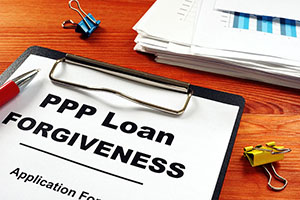New Change of Control Guidance for Companies That Received PPP Loans
 While the COVID-19 pandemic put a damper on a whole spectrum of business activity, recent months have seen some recovery in the M&A market. Many companies that may be subject to ownership changes or other restructuring in the near future received Paycheck Protection Program (PPP) loans earlier this year. Until recently, buyers and sellers contemplating such transactions were unclear about how to account for these obligations and what responsibilities a PPP borrower continues to hold regardless of any change in ownership.
While the COVID-19 pandemic put a damper on a whole spectrum of business activity, recent months have seen some recovery in the M&A market. Many companies that may be subject to ownership changes or other restructuring in the near future received Paycheck Protection Program (PPP) loans earlier this year. Until recently, buyers and sellers contemplating such transactions were unclear about how to account for these obligations and what responsibilities a PPP borrower continues to hold regardless of any change in ownership.
To provide clarity on these issues, the Small Business Administration (SBA) issued new guidance on Oct. 2that outlines the procedures that should be followed when there is a change in a borrower’s ownership.
What Constitutes a “Change In Ownership” for Purposes of PPP Obligations
Not all ownership transactions raise PPP issues. For purposes of the PPP, a “change of ownership” occurs when:
- At least 20 percent of the common stock or other ownership interest of a PPP borrower (including a publicly-traded entity) is sold or otherwise transferred, whether in one or more transactions, including to an affiliate or an existing owner of the entity;
- The PPP borrower sells or otherwise transfers at least 50 percent of its assets (measured by fair market value), whether in one or more transactions; or
- A PPP borrower merges with or into another entity.
Continued Obligations of a PPP Borrower
The SBA’s guidance clarifies that PPP borrowers remain on the hook for all repayment, certification, and documentation requirements related to the loan. Specifically, a borrower remains responsible for the following regardless of a change in ownership:
- Performance of all obligations under the PPP loan;
- The certifications made in connection with the PPP loan application, including the certification of economic necessity;
- Obtaining, preparing, and retaining all required PPP forms and supporting documentation and providing those forms and supporting documentation to the PPP lender or lender servicing the PPP loan (referred to as the “PPP Lender” in this Notice) or to SBA upon request;
- Compliance with all other applicable PPP requirements.
Notifying Lenders of Change in Ownership
Before closing any transaction that constitutes a change of ownership as described above, the PPP borrower needs to notify its PPP lender in writing of the contemplated transaction and provide the lender with a copy of the proposed agreements or other documents relating to the proposed deal.
When SBA Approval Is Required Before a Change of Ownership Occurs
Depending on the loan status or the nature of the transaction, the SBA may need to approve a change of ownership before it is consummated.
If the borrower has fully satisfied its PPP loan obligations, there are no restrictions on the change of ownership. This is the case when the borrower has repaid the note in full or has completed the loan forgiveness process and repaid any remaining balance on the loan.
For transactions closing before the borrower has satisfied its PPP loan obligations, a PPP lender may permit the transaction to proceed without prior SBA approval if:
- The sales or other transfers involve 50 percent or less of the common stock or other ownership interest of the borrower;
- The sales or other transfers involve more than 50 percent of the common stock, other ownership interest, or assets of the borrower and the borrower:
- submits to its lender a loan forgiveness application detailing its use of all PPP loan proceeds, together with supporting documentation; and
- establishes an interest-bearing escrow account controlled by the lender with funds equal to the PPP loan's outstanding balance.
Prior SBA approval is required for any changes in ownership not listed above. Much of the responsibility for obtaining that approval falls on the PPP lender as outlined in the SBA’s guidance.
For asset sales requiring SBA approval, the purchasing entity must assume all of the borrower's obligations under the PPP loan, including responsibility for compliance with the PPP loan terms.
PPP Questions? We Have Answers.
As any PPP borrower knows, the compliance requirements of the program can be complex and burdensome. Failure to follow the rules or provide needed documentation can put forgiveness at risk and lead to a host of other potential problems, including those involving a borrower’s contemplated change in ownership.
The business lawyers at Williams, Williams, Rattner & Plunkett work closely with business owners to help them reap the maximum benefit of their PPP loans while avoiding unnecessary risks. If you have questions or concerns regarding a PPP borrower’s change in ownership, please contact us today to arrange for a consultation.
 Robert S. Bick has extensive corporate law experience, having completed hundreds of merger, acquisition, divestiture, going private, financing, and related transactions. He represents clients of all sizes across a range of industries in business law matters.
Robert S. Bick has extensive corporate law experience, having completed hundreds of merger, acquisition, divestiture, going private, financing, and related transactions. He represents clients of all sizes across a range of industries in business law matters.
Click here to learn more about Rob and his practice.











